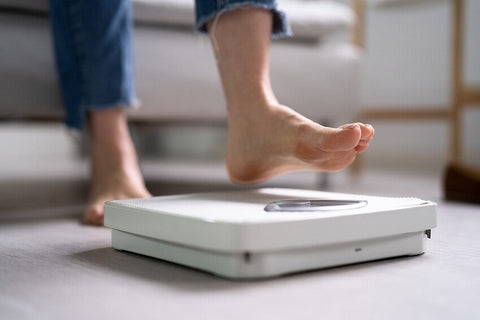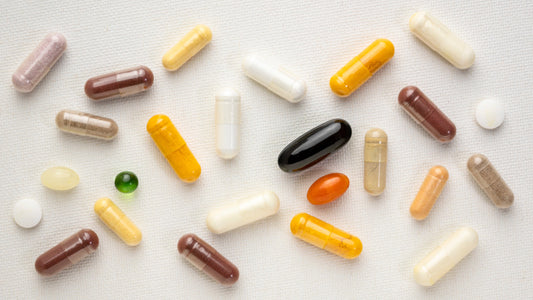Vitamin B12, also called cobalamin, is a water-soluble vitamin involved in several critical biological processes, from DNA and red blood cell production to energy, memory, and nervous system function.
But can it also be involved in weight gain? Studies suggest low B12 levels could cause you to pack on the pounds.
Vitamin and mineral supplements are popular among all age groups to enhance health and support optimal performance.
However, even though they’re completely natural, they can still have nutrient interactions and side effects when taken in excess—or sometimes not enough.
Low B12 levels can leave you feeling downright lousy—fatigued, depressed, mentally foggy, and more. Oh, and it could also put a few extra pounds on.
While research is still limited on the link between vitamin B12 and weight gain, most evidence suggests that the vitamin itself won’t cause you to put on pounds, but a deficiency may.
So, we’re going through the research and giving you the link between vitamin B12 and weight gain.
What is Vitamin B12?
Before we get into the link between B12 and weight, let’s first go over what vitamin B12 is.
Also known as cobalamin, vitamin B12 is a water-soluble vitamin that cannot be produced in the body and must come through diet or supplementation. It plays several critical roles in the body, notably in erythropoiesis and nerve cell function.
Although they each have their roles, vitamin B12 works closely with another B vitamin, folate, for the proper function of the nervous system, production of healthy red blood cells, and in S-adenosylmethionine (SAMe), a compound that supports mood and immune function 1.
But there’s something most people don’t know about B12: it’s not absorbed the same way other B vitamins are.
While water-soluble, vitamin B12 requires the presence of a protein called intrinsic factor (IF) for absorption; IF is produced by parietal cells of the stomach and is essential for the transportation and absorption of vitamin B12 in the terminal portion of the ileum 2.
Because sufficient amounts of IF are needed to bind to B12, and adequate stomach acid is required to activate IF, a deficiency of either can lead to a B12 deficiency and devastating health consequences.
For most adults, the recommended intake of B12 is just 2.4 micrograms (mcg), but for pregnant or breastfeeding women, the needs increase 3.
In addition, low levels of stomach acid and IF in older populations can make getting enough through diet tricky, which is why supplementation is typically recommended.
Key takeaway: Vitamin B12 is an essential nutrient that supports optimal body function, especially if your nervous system. Its most critical roles include supporting the production of healthy red blood cells, DNA synthesis, strengthening the brain and nervous system, and enhancing immune function.
Signs And Symptoms Of Vitamin B12 Deficiency
For your body to effectively absorb vitamin B12, your body requires a healthy gut with sufficient stomach acid, a well-functioning pancreas, and high levels of intrinsic factor.
While intake requirements for B12 are relatively small, unlike other B vitamins, the body stores extra B12 in the liver—only small amounts are lost through sweat, urine, or stools daily.
And because anywhere from 1 to 5 mg can be stored, a deficiency that develops from inadequate intake or absorption can take months to years to develop 4.
But once a deficiency develops, the consequences can be pretty severe. Keep in mind that the clinical manifestations of vitamin B12 deficiency differ depending on the degree and duration of deficiency, but some of the most common symptoms of a B12 deficiency include 4:
- Anemia
- Chronic fatigue
- Shortness of breath
- Heart palpitations
- Pallor
- Skin hyperpigmentation
- Glossitis
- Infertility
- Osteoporosis
- Sensory loss
- Abnormal balance or reflexes
- Cognitive impairment
- Memory loss
Older adults are at a higher risk for vitamin B12 deficiency, as are those on a vegetarian or vegan diet, as dietary B12 is found in animal products.
But here’s the thing we haven’t touched on: some research finds that a B12 deficiency can also result in weight gain. How? Keep reading to find out.
B12 And Weight Gain: Is There A Link?
Some research suggests that high levels of B12 may be protective against obesity and weight gain thanks to B12’s role in energy metabolism.
And while some studies show that lower B12 levels are linked to a higher risk of obesity, there’s no clear consensus that vitamin B12 deficiency leads to weight gain.
Let’s look at the science.
A 2020 study published in Environmental Research found that children and adolescents with higher vitamin B12 levels were less likely to be obese 5.
Similarly, an earlier study published in the Journal of Nutrition found that children with a higher body mass index (BMI) had lower serum levels of vitamin B12 6.
But it’s not just children. A 2019 study published in Frontiers in Endocrinology looked at over 9,000 adults and discovered that serum B12 concentrations were lower among obese adults than non-obese adults 7.
The results were still true when adjusting for other factors influencing levels—age, diet, lifestyle, supplement use, etc.
That said, many of the studies on B12 and weight only show a link between low B12 levels and weight gain—they don’t prove that vitamin B12 deficiency causes weight gain or that increasing B12 levels could help you slim down.
However, a study investigating the effects of dietary supplements on weight management found that long-term use of B12 supplements was linked to less weight gain among middle-aged people over ten years 8.
Even still, observational studies can’t confirm whether low B12 levels cause weight gain or whether supplementation can protect against it.
There’s no clear understanding of why adequate levels of B12 are associated with a reduced risk of obesity, but there are a few theories 9-11:
- B12 may influence how the body stores fat
- B12 is required for proper muscle protein, and low levels could interfere with recovery
- Insufficient B12 impairs red blood cell production and interferes with oxygen delivery to muscles
Key takeaway: There is some evidence linking low B12 levels to a higher risk of obesity in children, adolescents, and adults, but the evidence is too weak to confirm a relationship.
How To Get Enough Vitamin B12
When it comes to vitamin B12, there are two routes you can go: diet or supplementation. But because B12 is exclusive to animal products and fortified foods, vegans and vegetarians are subject to an increased risk of deficiency.
Some of the highest sources of vitamin B12 include:
- Organ meats
- Beef
- Chicken
- Fish (salmon, sardines, tuna, trout)
- Shellfish (clams)
- Milk
- Cheese
- Yogurt
- Eggs
- Fortified foods: Breakfast cereal, nutritional yeast, plant milk
Supplements are another easy way to meet your needs. Whether it’s a pure sublingual B12 supplement or a multivitamin like Performance Lab NutriGenesis Multi, they’re an easy way to obtain your intake requirements, especially for people with low stomach acid of intrinsic factor 9.
The Bottom Line
Vitamin B12 is an essential water-soluble nutrient involved in energy metabolism, cognition, nervous system health, and more. It’s widely available in animal food sources and supplementation, so fulfilling your daily requirement should be easy.
While a B12 deficiency is not uncommon, it can take years to develop, and the signs and symptoms range depending on the severity and duration of the deficiency—but weight gain isn’t likely to be one.
Although some research links low B12 levels to an increased risk of obesity and weight gain, the evidence isn’t sufficient to confirm the link.
References
- Bottiglieri T. Folate, vitamin B₁₂, and S-adenosylmethionine. Psychiatr Clin North Am. 2013;36(1):1-13.
- Oh R, Brown DL. Vitamin B12 deficiency. Am Fam Physician. 2003;67(5):979-986.
- Institute of Medicine (US) Standing Committee on the Scientific Evaluation of Dietary Reference Intakes and its Panel on Folate, Other B Vitamins, and Choline. Dietary Reference Intakes for Thiamin, Riboflavin, Niacin, Vitamin B6, Folate, Vitamin B12, Pantothenic Acid, Biotin, and Choline. Washington (DC): National Academies Press (US); 1998. 9, Vitamin B12. Available from: https://www.ncbi.nlm.nih.gov/books/NBK114302/
- Hunt A, Harrington D, Robinson S. Vitamin B12 deficiency. 2014;349:g5226.
- Uche UI, Suzuki S, Fulda KG, Zhou Z. Environment-wide association study on childhood obesity in the U.S. Environ Res. 2020;191:110109.
- Gunanti IR, Marks GC, Al-Mamun A, Long KZ. Low serum vitamin B-12 and folate concentrations and low thiamin and riboflavin intakes are inversely associated with greater adiposity in Mexican American children. J Nutr. 2014;144(12):2027-2033.
- Sun Y, Sun M, Liu B, et al. Inverse Association Between Serum Vitamin B12 Concentration and Obesity Among Adults in the United States. Front Endocrinol (Lausanne). 2019;10:414.
- Nachtigal MC, Patterson RE, Stratton KL, Adams LA, Shattuck AL, White E. Dietary supplements and weight control in a middle-age population. J Altern Complement Med. 2005;11(5):909-915.
- Boachie J, Adaikalakoteswari A, Samavat J, Saravanan P. Low Vitamin B12 and Lipid Metabolism: Evidence from Pre-Clinical and Clinical Studies. Nutrients. 2020;12(7):1925.
- Allen LH. Vitamin B-12. Adv Nutr. 2012;3(1):54-55.
- Lukaski HC. Vitamin and mineral status: effects on physical performance. 2004;20(7-8):632-644.
- Chan CQ, Low LL, Lee KH. Oral Vitamin B12 Replacement for the Treatment of Pernicious Anemia. Front Med (Lausanne). 2016;3:38.
















